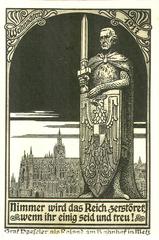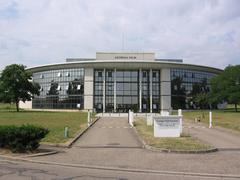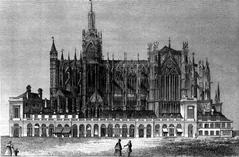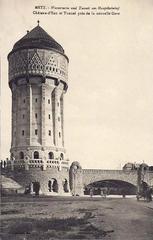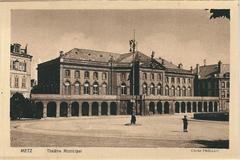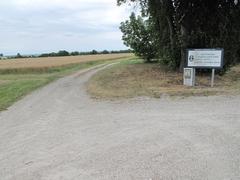
Arsenal De Metz: Visiting Hours, Tickets, and Complete Historical Site Guide
Date: 04/07/2025
Introduction
Located in the heart of Metz, France, the Arsenal de Metz—renamed the Arsenal-Jean-Marie-Rausch in 2024—stands as a testament to the city’s dynamic transformation from a military stronghold to a celebrated center for music and culture. This comprehensive guide provides essential information on visiting hours, ticketing, accessibility, the site’s rich history, architectural features, and nearby attractions, ensuring you make the most of your visit to one of Europe’s premier concert halls (Arsenal-Jean-Marie-Rausch Guide; Planum Cultural Heritage).
Historical Background and Transformation
Origins and Military Purpose
Constructed between 1860 and 1864 during the reign of Napoleon III, the Arsenal de Metz initially served as a critical military arsenal on the French-German frontier. Built with the region’s iconic Jaumont stone, the building’s sober, quadrangular architecture reflected the utilitarian yet grand style of 19th-century military constructions. Its strategic location in Metz reinforced the city’s role as a fortified bastion, particularly during the Franco-Prussian conflicts.
Heritage Conservation
A unique aspect of the Arsenal’s design was the preservation of earlier historical elements. Notably, the 12th-century Templar chapel—thanks to Prosper Mérimée’s intervention—was incorporated into the complex, and the original “magasin aux vivres” (food storehouse) was maintained, providing visitors with direct links to Metz’s layered history (Planum Cultural Heritage).
From Military Depot to Cultural Landmark
Following decades of military use, including shifts in control during both World Wars, the Arsenal was decommissioned after WWII and lay dormant until the late 20th century. The turning point came in 1978, when Mayor Jean-Marie Rausch spearheaded an ambitious urban renewal project to repurpose the site as a cultural venue. This vision materialized through an international architectural competition, won by Ricardo Bofill and his team, who masterfully merged the historic fabric with contemporary design.
The Arsenal reopened in 1989 as a state-of-the-art concert hall. It has since become a symbol of Metz’s cultural renaissance, acclaimed for its architectural harmony, acoustic brilliance, and commitment to heritage conservation (Planum Cultural Heritage; Visit Grand Est).
Recent Developments
In February 2024, the venue was officially renamed Arsenal-Jean-Marie-Rausch, honoring the mayor whose leadership was instrumental in its transformation and the revitalization of the Citadel district.
Visitor Information
Visiting Hours
- Box Office:
- Monday to Friday: 10:00 AM–6:00 PM
- Saturday: 10:00 AM–2:00 PM
- Closed on Sundays and public holidays (except on event days)
- General Access:
- Venue opens typically one hour before scheduled concerts or exhibitions.
- Guided Tours:
- Offered periodically; check the official calendar for scheduling.
Tickets and Booking
- Purchase Channels:
- Official website
- On-site box office
- Authorized ticket vendors
- Pricing:
- Standard tickets: €15–€70, depending on event and seat
- Discounts available for students, seniors, families, and groups
- Advance booking highly recommended
Accessibility
- Fully accessible to visitors with reduced mobility: ramps, elevators, and designated seating
- Hearing assistance devices available for most events
- Accessible parking spaces in the adjacent underground lot
Getting There
- Address: Arsenal de Metz, 3 Avenue Ney, 57000 Metz, France
- Public Transport: Close to Metz-Ville train station; well-served by bus and tram stops (“République” and “Esplanade”)
- Parking: Underground parking at the venue and public lots nearby
- On Foot: 10–15 minutes from key city landmarks
Visitor Amenities
- Modern cloakroom
- Bar/café with local specialties
- Boutique with music-themed gifts
- Restrooms (accessible)
- Spacious reception and social areas
Architectural and Acoustic Highlights
Architectural Transformation
Ricardo Bofill’s redesign in the 1980s retained the Arsenal’s original Jaumont stone facades while introducing contemporary features such as a terrace overlooking historic sites. The minimalist, light-filled interiors use warm woods and noble materials to create an inviting atmosphere with outstanding acoustics (Visit Grand Est).
Performance and Exhibition Spaces
- Grande Salle: Seats 1,311–1,350; praised for its exceptional acoustics, ideal for orchestral performances and recordings
- Salle de l’Esplanade: 352 seats, suited to chamber music and recitals
- Studio du Gouverneur & Salle de l’Orangerie: Flexible spaces for rehearsals, workshops, and special events
- Chapelle des Templiers: Intimate venue for exhibitions and chamber concerts
- Gallery: 115 meters of exhibition space for visual arts
Acoustic Excellence
The Grande Salle’s rectangular design and wood finishes provide world-class sound, drawing praise from artists such as Mstislav Rostropovich and making the Arsenal a sought-after recording venue.
Programming and Cultural Policy
Diversity of Offerings
The Arsenal hosts approximately 200 annual performances, encompassing:
- Symphonic and chamber music
- Jazz, world music, and dance
- Choral and baroque concerts
- Family-friendly workshops and youth programs
- Visual art exhibitions
Resident Ensembles & Collaborations
Home to the Metz National Orchestra and frequent collaborations with international artists, the Arsenal is integral to Metz’s status as a UNESCO Creative City of Music (Tourisme Metz).
Educational and Community Initiatives
- Workshops and masterclasses
- School partnerships and participatory projects
- Inclusive programming for diverse audiences
Exploring Metz: Nearby Attractions
Enhance your Arsenal visit with these local highlights:
- Cathédrale Saint-Étienne de Metz: Gothic masterpiece, 10 minutes’ walk (Visit Grand Est)
- Centre Pompidou-Metz: Contemporary art, 15 minutes’ walk
- St Pierre-aux-Nonnains Basilica: Ancient Romanesque church, adjacent to the Arsenal
- Chapelle des Templiers: Medieval chapel, integral to the Arsenal site
- Jardin de l’Esplanade: French-style gardens next to the venue
- Musée de la Cour d’Or: Archaeology and fine arts museum
- Porte des Allemands: Medieval city gate, 20 minutes’ walk
- Quais de la Moselle: Riverside walks
For day trips:
- Amnéville: Spa and wildlife park (Tourist Places Guide)
- Verdun: WWI heritage site
Visitor Tips
- Plan ahead: Check the official calendar for events and ticket availability.
- Arrive early: Enjoy the architecture and adjacent gardens.
- Dress code: Smart casual is recommended for evening events.
- Language: Most events are in French, but staff can assist English speakers.
- Photography: Not allowed during performances; permitted in public areas before/after events.
- Accessibility: Contact the box office in advance for specific needs.
- Maps: Use the Metz tourist map for navigation.
Frequently Asked Questions (FAQs)
Q: What are the Arsenal de Metz visiting hours?
A: The box office is open Monday to Friday 10:00 AM–6:00 PM, Saturday 10:00 AM–2:00 PM. Venue access is generally one hour before events. Always refer to the official site for updates.
Q: How do I buy tickets?
A: Purchase online (official site), at the box office, or via phone. Early booking is advised.
Q: Is the venue accessible for wheelchairs?
A: Yes, including ramps, elevators, and designated seating.
Q: Are guided tours available?
A: Guided tours are offered on select dates; check the website for availability.
Q: What are some recommended nearby attractions?
A: Cathédrale Saint-Étienne, Centre Pompidou-Metz, St Pierre-aux-Nonnains Basilica, Chapelle des Templiers, and the Jardin de l’Esplanade.
Visuals and Media
Explore the Arsenal’s architecture and event spaces via the virtual tour on the official website.
Conclusion
The Arsenal de Metz is a shining example of adaptive reuse, merging historical gravitas with contemporary cultural innovation. Its prime location, outstanding acoustics, and broad artistic programming make it a must-visit destination for anyone exploring Metz. Secure your tickets, plan your visit, and immerse yourself in the unique blend of history, architecture, and music that defines this iconic venue.
Download the Audiala app for personalized recommendations, and stay connected for updates on Metz’s vibrant cultural scene.
Sources and Further Reading
- Arsenal-Jean-Marie-Rausch Guide
- Discover Arsenal de Metz
- Planum Cultural Heritage
- Visit Grand Est
- Tourisme Metz: Metz UNESCO Creative City of Music
- Tourist Places Guide: Top Tourist Attraction and Places Map of Metz



